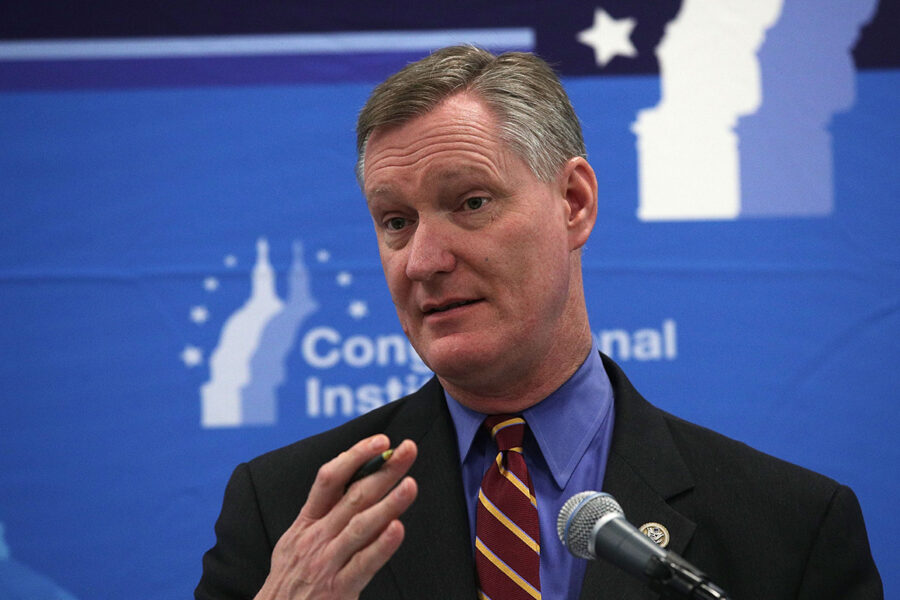Republicans go all-in on immigration as a political weapon

Kristi Noem is sending the South Dakota National Guard to the U.S.-Mexico border. Florida’s Ron DeSantis is providing law enforcement officers. Greg Abbott is vowing that Texas will build its own wall.
With Donald Trump and a dozen House Republicans joining Abbott on the border on Wednesday, the GOP is loudly signaling its conviction that immigration will be a potent political weapon ahead of the midterm elections and presidential primary in 2024.
“As an issue, I can’t think of one that’s better,” said Jeff Roe, a Republican strategist and top adviser to Texas Sen. Ted Cruz’s presidential campaign in 2016. “One day they’re erecting a wall to keep illegal immigrants out, and the next day it’s 180,000 people coming across the border. It’s incredible. It’s just enigmatic of Biden’s failure … I mean, what the f— is going on?”
Five years after Trump rallied Republican primary voters with his chants of “Build that wall!” the election of a Democratic president coupled with the recent increase of migrants from Latin America has afforded Republicans a new opening on border security. It’s gaining traction in advertising in Republican campaigns across the country, and it has turned the southern border into a destination for candidates seeking to burnish their conservative bona fides at home.
“It’s off the Richter scale in terms of importance for the Republican electorate,” said John Thomas, a Republican strategist who works on House campaigns across the country. “It transcends jurisdictions. So, it goes from the suburbs of Orange County to statewide in Nevada … It’s even going to be included in a judicial race I’m doing in Fort Worth.”
Republicans have reason to be optimistic about the potential of immigration as a voting issue — and a potential point of weakness for the Democratic Party. In a Harvard CAPS-Harris poll this month, voters rated immigration just behind the economy and jobs on issues of importance, a finding in line with Republicans’ internal polling. Biden’s approval rating on immigration is still above water at 52 percent, according to the poll. But that’s a weaker endorsement of Biden than on any other subject measured, from the economy to crime and response to the coronavirus.
A Morning Consult survey last month suggested Democrats may be on even shakier ground, with disapproval of Biden’s handling of immigration outpacing approval 48 percent to 42 percent.

Whit Ayres, the longtime Republican pollster, called immigration “one of the top three vulnerabilities of the administration.” Dave Carney, the Republican strategist who advises Abbott, described the Biden administration’s management of the border as a political “gift,” while Shawn Steel, a Republican National Committee member from California, predicted immigration and crime will be the “twin drivers” of Republicans’ midterm campaigns.
“Democrats couldn’t have asked for worse timing,” Steel said. “It’s the volume, it’s the lack of control … You’re seeing a border that wasn’t even an issue in 2020 coming to the forefront.”
Nowhere is the issue more resonant than Texas, the border state where Trump appeared Wednesday beside Abbott, with the former president accusing Democrats of either being “incompetent” on border security or favoring “open borders.” Customs and Border Protection reported more than 180,000 migrant encounters at the border in May, up from about 23,000 in the same month in 2020, during the coronavirus pandemic, and about 144,000 in May 2019.
Before Trump’s visit, the RNC bracketed Vice President Kamala Harris’ visit to the border at El Paso last week with mobile billboards criticizing the “Biden-Harris Border Crisis,” and a newspaper ad in McAllen, a border city of more than 140,000 people, painted Rep. Vicente Gonzalez (D-Texas) as complicit in what it called Biden’s “open borders agenda.” In a state whose electorate ranks immigration and border security above even the economy and the coronavirus as the most important problem facing the state, Republicans believe Democrats are especially vulnerable on the issue.
But GOP spending patterns suggest immigration resonates far beyond Texas or other border states. In Ohio, former Rep. Steve Stivers aired ads this month endorsing state Rep. Jeff LaRe to succeed him, pairing video of border wall construction with a promise that LaRe, among other reasons to elect him, would work to “strengthen our borders.” In Pennsylvania, Republican Jeff Bartos, a real estate developer running for the state’s open Senate seat, is putting out list-building digital ads asserting the state’s taxpayers “shouldn’t foot the bill for Biden’s Border Crisis.”

“There’s a reason why Trump got elected,” said Carl Fogliani, a Republican strategist based in Pittsburgh. “It’s the dominant issue. It’s obvious.”
In Arizona, Republican Jim Lamon, a businessperson running in the 2022 campaign to challenge Democratic Sen. Mark Kelly, aired TV ads this month featuring footage of immigrants jumping border barriers — a throwback to the controversial, grainy footage of immigrants streaming across the U.S.-Mexico border that then-California Gov. Pete Wilson employed in his 1994 re-election campaign.
A similar digital ad campaign by the Federation for American Immigration Reform, which favors reducing overall immigration, is even more explicit, employing the same opening line as Wilson used in his infamous ad: “They keep coming.” The ad is running in 20 markets, according to the group, targeting Democratic lawmakers for “encouraging illegal immigration,” a claim Democrats deny. Republicans believe the issue works in their favor not just in districts near the border, but in competitive races everywhere, lumping it in with broader law and order concerns.
There is a risk that Republicans might go too far. Wilson’s messaging around immigration in 1994 — including with his championing of Prop. 187, the initiative to restrict services to undocumented immigrants — was widely seen as contributing to the Republican Party’s decline with Latino voters in the 1990s and early 2000s. In 2018, Republicans pleaded unsuccessfully with Trump ahead of the party’s midterm shellacking to focus less on the border and more on the economy. And two years later, it was not immigration, but Trump’s working-class economic message, that helped him to make marginal gains with Latino voters.
“Trump had literally created a roadmap of incremental gains with Hispanic voters by not being racially aggressive and by leading with economic populism, and now you have the Republican Party backtracking on it,” said Mike Madrid, a Republican strategist who was a co-founder of the anti-Trump Lincoln Project before stepping down in December.
In the party’s current push on immigration, he said, “They risk losing whatever incremental gains they made with Latino voters that will be necessary to hold the House … Instead of talking about economic populist messages, which Trump did to marginal success in 2020, they’re choosing a 2018 model instead of a 2020 model. It doesn’t make sense.”
The Biden administration has said Trump’s immigration policies were both ineffective and inhumane. Harris said at the border last week that the administration is focused on “root causes” of migration, including violence and lack of economic opportunity in other countries, and during a trip to Guatemala this month told migrants directly “do not come” to the border. And many Republicans acknowledge that Trump’s harsh rhetoric about “rapists” and “criminals” crossing the border was unhelpful in the midterm elections.
For that reason, having Trump at the border this week might not ultimately benefit the party. But there is widespread agreement among Republican strategists that the issue of immigration itself will.
In 2018, Thomas said, Republicans paid a price for Trump’s rhetoric with voters who “were concerned about the way he framed the issue and vilified immigrants.”
Without Trump in office, Thomas said, “There’s not a figurehead at the top who is using inflammatory language that might turn off those voters that actually do want border enforcement but don’t want the vilification of human beings.”
Go To Source
Author: POLITICO

